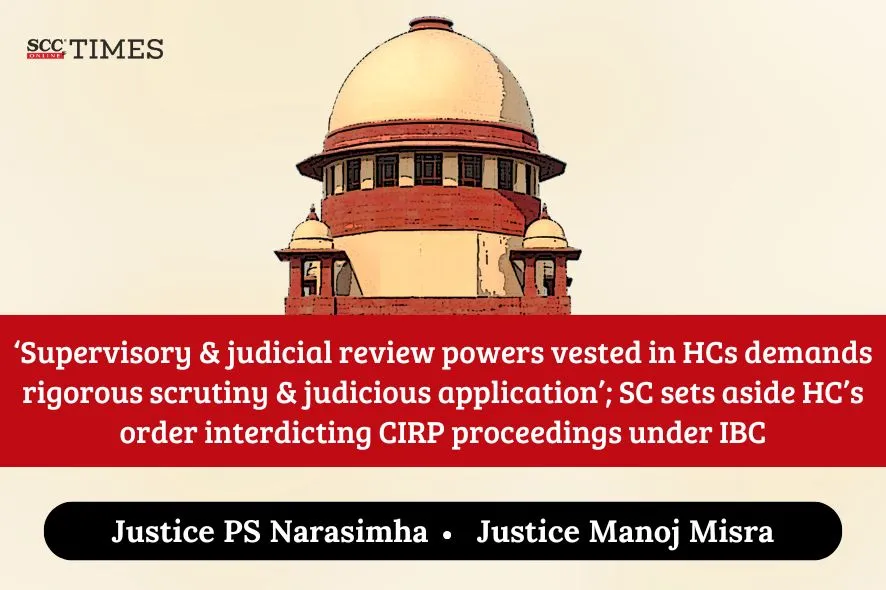Supreme Court: In a batch of three civil appeals, one by the successful resolution applicant METL (appellant), the other by the Bank comprising the Committee of Creditors, and the third appeal by the Resolution Professional appointed by the adjudicating authority to conduct CIRP against Associate Decor Ltd. (“Corporate Debtor”), assailing the Karnataka High Court’s decision interdicting the Corporate Insolvency Process, set aside the resolution plan, primarily on the ground that principles of natural justice were violated as 24 hours’ notice was not granted the Division Bench of PS Narasimha and Manoj Misra, JJ. held that in view of the delay in approaching the High Court, particularly when respondent 1 initiated proceedings under the Insolvency and Bankruptcy Code, 2016 (‘Code’) by filing interlocutory applications seeking similar relief, the High Court committed an error in entertaining the writ petition. Hence, the Court allowed the appeals and set aside the final judgment and order passed by the High Court
The Bench directed the Adjudicating Authority to commence the proceedings from where it was interdicted by the High Court and complete the same as expeditiously as possible, which is also the spirit of the Code.
Background
The Corporate Insolvency Resolution Proceedings were admitted against the corporate debtor at the instance of the Oriental Bank of Commerce (a financial creditor). The successful resolution applicant submitted that he submitted his expression of interest upon the resolution professional issuing the Information Memorandum under Section 29 of the Code. It was also submitted that resolution plans were reviewed, and the appellant was asked to incorporate certain items. Another director of the corporate debtor representing the suspended director confirmed that “they have no objection to the plans or to the process that was followed.” This stand was opposed by the suspended director of the corporate debtor. While the appellant contended that the second adjourned 19th CoC meeting was convened after notice to all, the suspended director submitted that no such notice was ever received by him. In the meeting, a slightly revised, amended, and re-stated resolution plan was considered, deliberated upon by the CoC and put to vote. The appellants’ plan was approved and the resettlement proposal submitted by respondent 1, the suspended director was rejected.
There were certain proceedings initiated by another company, whose request for filing a resolution plan was rejected, leading to the said company filing an interlocutory application before the Adjudicating Authority seeking directions to the CoC to reconsider the resolution plan. The Adjudicating Authority’s decision to place the resolution plan for reconsideration by the CoC was appealed to the NCLAT. The appellant submitted that the suspended director of the corporate debtor also filed an interlocutory application before the NCLAT seeking rejection of the resolution plan of the applicant. The NCLAT allowed the appeal and set aside the directions of the Adjudicating Authority.
The suspended director approached the High Court by filing the writ petition to quash the minutes of meeting, letter of intent, declaration of respondent 1 as successful resolution applicant, and direction to the CoC for acceptance of its proposal.
Analysis and Decision
The Court noted that the CIRP proceedings commenced on 26-10-2018. The Court also noted that when respondent 1 was not given a notice before the 19th CoC meeting, this was on 11-02-2020. The Court said that, however, the jurisdiction of the High Court was invoked only on 04-01-2023. The Court said that the time gap between these two events was almost three years, hence, the contention that there was no delay in approaching the High Court, must be rejected.
The Court added that the High Court was aware of respondent 1 availing the statutory remedy under the Code, hence, the High Court should have relegated respondent 1 to the procedure under the Code and permitted him to continue the remedy that chose to adopt. The Court pointed out that the importance of concluding the CIRP proceedings was highlighted by this Court, on a number of occasions and in Committee of Creditors of KSK Mahanadi Power Company Ltd. v. Uttar Pradesh Power Corporation Ltd.1, it was observed that an unjustified interference with the proceedings initiated under the Insolvency and Bankruptcy Code 2016, breaches the discipline of law.
The Court also added that apart from delay and laches, the High Court should have noted that the IBC is a complete code in itself, having sufficient checks and balances, remedial avenues and appeals. Adherence of protocols and procedures maintains legal discipline and preserves the balance between the need for order and the quest for justice. The Court stated that, supervisory and judicial review powers vested in High Courts represent critical constitutional safeguards, yet their exercise demands rigorous scrutiny and judicious application. This is certainly not a case for the High Court to interdict CIRP proceedings under the Insolvency and Bankruptcy Code.
CASE DETAILS
|
Citation: Appellants : Respondents : |
Advocates who appeared in this case For Petitioner(s): For Respondent(s): |
CORAM :
1. Civil Appeal No. 11086 of 2024, dated 14.10.2024.









Tushar Mehata , solicitor general can not act as advocate of both petitioners and respondents, this is a serious lapse.